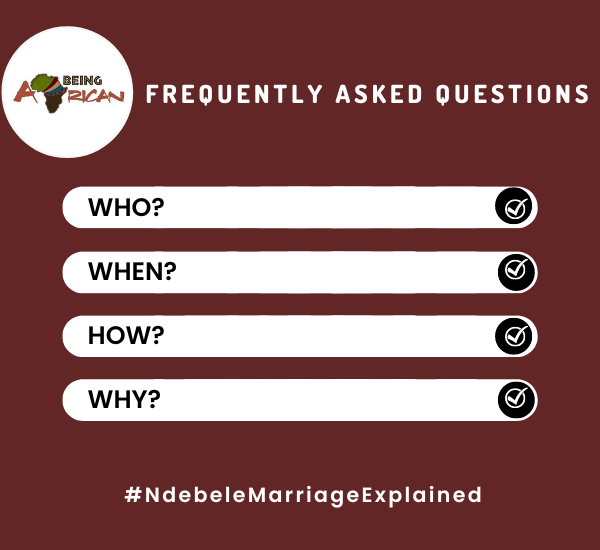
Ndebele Frequently Asked Questions
Key roles explained
- The Groom’s chief negotiator – (Idombo)
- The Groom’s Uncle – (Malume)
- The Bride’s Aunt – (Ubabakazi)
- Bride and Groom’s parents – (Ubabazala, Umamazala)
- Other extended family members – (Izihlobo)
The Groom’s Uncle – (Malume)
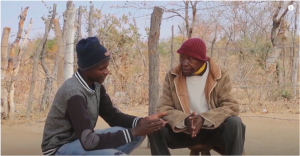
The groom informing his Uncle about his intentions to marry, and showing him the gift he exchanged with the bride.
Who is Uncle – Malume?
- Malume is usually a male who’s a brother to ones mother.
What is Malume’s role on the groom’s side of the family?
- Advocate for the groom throughout the lobola process.
- The groom kick starts the lobola process by informing the Malume, who will in turn inform the groom’s parents.
- Malume can also act as the “Spokesperson” for the groom’s family and the Mediator between the two families during the bride price negotiations
- Supports and gives advice to the groom
The Bride’s Aunt-Ubabakazi
Who is Ubabakazi?
- Bride’s paternal aunt(s). Father’s sister(s)
- Can also be a female representative from extended family
- Occasionally a family friend may be requested
What is Ubabakazi’s role on the bride’s side of the family?
- Advocate for the bride throughout the lobola process.
- The bride kick starts the lobola process by informing the Ubabakazi, who will in turn inform the bride’s parents and other members of the bride’s family.
- Mediator between the two families during the bride price negotiations.
- If situations get tense or the prices are way out of range, the groom’s people can take her to the side and explain where they stand, and she can negotiate with the bride’s father(s)
- Supports and gives advice to the bride
- “Spokesperson” for the bride’s family
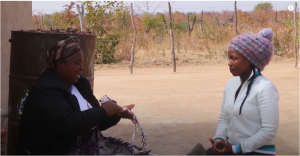
The bride informing her Aunt about her intentions to get married, and showing her the gift she exchanged with the groom.
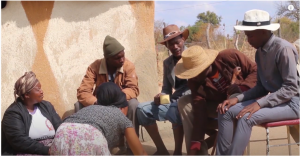
The bride’s Aunt informing the bride’s parents and other members of the bride’s family about the upcoming visit by the groom’s party.
Idombo – Chef Negotiator
Who is Idombo?
-
- Idombo is the go-between and a spokesperson for the groom’s family
What is Idombo’s role?
-
- He is responsible for solving any problems or easing tension during bride price negotiations
Who can take the role of Idombo?
-
- Idombo can be one of the groom’s uncles
- can be from immediate or extended family
- A respected member of the community
- A male family friend
Qualities to look for Idombo
-
- Good temperament
- Excellent communications skills
- Maturity, sensitivity and dependability
- Good sense of humor
- Cultural etiquette
Ndebele lobola process: Step by step explanation
- Exchange of gifts between the man and woman
- Informing Malume and Ubabakazi.
- Declaration of Intentions – Ukuyavela
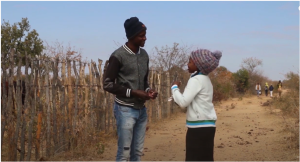
The couple exchange gifts as a sign of commitment to each other
- Prior to getting married the traditional way, the man and the woman exchange gifts
- Popular items exchanges include jewelry, a piece of cloth such as a shirt or tie and other material things.
1. Why is the exchange of gifts necessary?
-
- The exchange of gifts is a sign of commitment of the couple to each other.
- The man can present the gift to his uncle, and likewise the woman to her aunt, to prove that they have found a potential suitor and they are committed to each other.
- Upon being presented with the gift, the Uncle and Aunt can proceed with the necessary procedure for the traditional marriage.
2. Informing Malume and Ubabakazi
What is the significance of informing Malume and Ubabakazi the of the intentions of the bride and groom?
-
- Before the lobola process takes place, the bride and groom approach their respective aunt(s) or uncle(s) to present the case that they intend to get married.
- Culturally, the bride or groom cannot formally inform their parents and other family members directly about their marriage intentions.
- Informing Malume and the Ubabakazi shows that the groom and bride respectively have given the idea of marriage serious thought and they are ready to get married.
- Malume and Ubabakazi are responsible for initiating the lobola process by informing the parents and other family members.
- They also sometimes act as mediators between the two families during the bride price negotiations.
Steps of the Lobola process
- Ukungena ekhaya
- Isivulamlomo
- Acknowledgement
- Lobola
- Umthimba
- The grooms family meets to discuss the date they intend to visit the bride’s homestead for the lobola process.
- The date is communicated to the bride’s family through Ubabakazi.
- The groom’s family is given a specific date and time to arrive.
- If the date is acceptable, the two families formally meet on the agreed day at the bride’s homestead for the lobola negotiations.
1. Ukungena ekhaya
What is Ukungena ekhaya?
-
- On the day of lobola, the grooms party do not immediately enter the homestead of the bride upon arrival.
- They wait outside, until they pay a price or gift to allow them to enter.
- This payment is known as Ukungena ekhaya.
What are the ramifications of arriving late on the day of the occasion?
-
- Arriving late may be taken as a sign of disrespect for the bride’s party that would have gathered and waiting for the groom’s party to arrive.
- A fine for arriving late may be imposed by the bride’s party during the lobola negotiations.
2. Isivulamlomo
What is Isivulamlomo?
-
- In the Ndelele lobola process, Isivulamlomo means opening one’s mouth to speak
- There is a fee for Isivulamlomo.
What is the fee for?
-
- The bride’s family require the fee to initiate dialogue. This fee is paid at the beginning of the lobola process.
- Therefore the groom’s party is asked to pay a token fee to make an official request to speak freely and also to be heard.
- At this point the groom is not yet embraced as a family member. The bride’s family is approached with humble submission and respect since gathering these particular elders for lobola is highly important.
- It is a sign of respect by the groom’s party. It gives the process decorum and dignity
- By accepting the fee the bride’s family agrees to participate in the dialogue
3. Acknowledgement
-
- After paying Is’vulumlomothe groom’s spokesman (Idombo) is asked why they have come to the bride’s home, at which point he declares he has been sent by the groom to request to marry their daughter.
- The young ladies who have reached the marriage age are summoned into the negotiating room so that the acknowledgement process takes place.
- Idombo must articulate which female in the homestead they intend to seek a hand in marriage.
- The ceremony can only begin after the bride has also acknowledged the groom’s name.
What is the fee significance of the acknowledgement?
-
- The acknowledgement process is necessary to ensure that there is consent from both the bride and groom.
4. Lobola
What is Lobola?
-
- This is money or wealth paid to the father of the bride or whoever is playing the role of the father in the marriage process ( the biological father may be absent or he chooses to delegate the responsibility for many reasons).
- Lobola is mandatory in the process.
- It is the real bride price.
- Can also be in the form of livestock (e.g. cattle).
Why is lobola important in the marriage process?
-
- It is the most important fee in the marriage process.
- It is a valued aspect of tradition.
- If you do not meet this requirement , you have not married.
What makes up lobola (bride price)?
Lobola Typically consists of;
-
- Inkomokamama/ Inkomo enkulu -Mother’s Cow given to the brides mother as a token of appreciation for raising his bride. This cow has to be a live beast and cannot be translated to a cash equivalent.
- Umqholiso -Welcome cow. The cow that welcomes the bride to her new home. The bride would not be allowed to eat any of this cow’s meat.
- Isikhumba – Groom gives this to the brides’ father for the head of household.
- .Imbeka – Bride will give this cow to the family to celebrate and it can be slaughtered at a later date, even after a year.
- Isibhoma -Gift from the groom to the bride, traditionally for her to make a leather skirt wear in the home
Other Items -list of items that the groom must bring for the ceremony
-
- Ijazi likababa – A jacket for the bride’s father
- Ingubo kamama – A blanket for the bride’s mother
Is lobola negotiable?
-
- Yes, the mandatory bride price (lobola) is negotiable.
- After receiving the full bride price required by the bride’s family, the uncles would then relay the information to the would be groom, who might accept the price as it is, or ask them to re-negotiate.
Can lobola be paid in installments?
-
- Yes, lobola can be paid in installments
- Only after paying the first installment of lobola can the man be recognized as the son in law, umkhwenyana.
- The bride is also properly introduced and handed over to her in laws.
5. Umthimba
What is Umthimba?
-
- This is a party is thrown to celebrate the union of the two families.
- This is done after the grooms party has fulfilled the initial part payment of the bride price.
Lobola meeting after two years
Why is there a subsequent lobola meeting after two years?
-
- Usually, during the first part of the negotiations which would have happened two years prior to this meeting, an outstanding balance would have been incurred by the groom.
- The bride’s party and the groom’s party reconvene after about two years to proceed with the lobola negotiations.
- The purpose of this meeting is to pay as much of the outstanding balance as possible.
